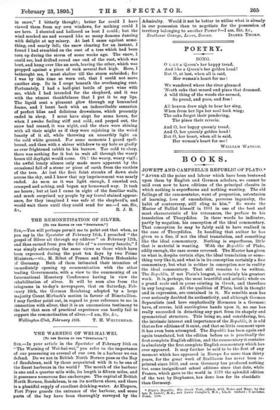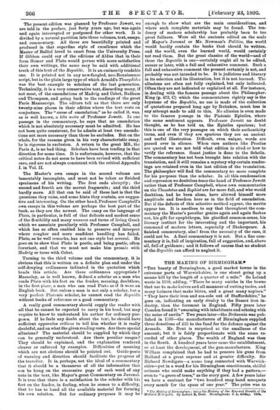BOOKS.
JowErr AND CAMPBELL'S REPUBLIC OF PLATO.* "AFTER all the pains and labour which have been bestowed upon them by English and German scholars, we cannot be
said even now to have editions of the principal classics in which nothing is superfluous and nothing wanting. The old
failings of the commentator, want of proportion, ostentation of learning, love of emendation, perverse ingenuity, the habit of controversy, still cling to him." So wrote the
Master of Bathed himself in 1881 in one of the best and most characteristic of his utterances, the preface to his translation of Thucydides. In these words he indicates, partly by negation, his conception of the ideal commentary. That conception he may be fairly said to have realised in the case of Thncydides. In handling that author he Ilea given us a fine, if not the ideal translation, and something like the ideal commentary. Nothing is superfluous, little
that is material is wanting. With the Republic of Plato,
oddly enough, the case seems reversed. The Master has given us what is, despite certain slips, the ideal translation or some-
thing very like it, and what is in its conception certainly a fine
commentary, but what is neither in conception nor in reality the ideal commentary. That still remains to be written.
The Republic, if not Plato's longest, is certainly his greatest
work. It is, perhaps, the most beautiful and arti8ti3 whole on a grand scale and in prose existing in Greek, and therefore in any language. All the qualities of Plato, both in thought and in expression, are contained in it. No sensible man has ever seriously doubted its authenticity, and although German Separatists (and here emphatically Hermann is a German), have, of course, laid sacrilegious hands upon it, no one has really succeeded in detaching any part from its shapely and symmetrical structure. This being so, and considering, too;
the intrinsic interest and importance of the Republic, it is odd that so few editions of it exist, and that so little comment upon it has even been attempted. The Republic has been again and again translated, but the edition before us is practically the first complete English edition, and the commentary it contains is absolutely the first complete English commentary which has ever appeared. It may further be said to be the first of any moment which has appeared in Europe for more than thirty years, for the great work of Stallbaum has never been re- printed since 1859, and even Germany has produced nothing but some insignificant school editions since that date, while France, which gave to the world in 1578 the splendid edition of the text by Stephanus, has done less for its elucidatie than Germany.
• Plato's Republic. The Greek Text, edited, w:th Nao. and Map., by the late B. Jewett, M.A., and Lewis Campbe'l, MA, LL.D. Oxford : C arendon.
Pres,. 104.
The present edition was planned by Professor Jowett, we are told in the preface, just forty years ago, but was again and again interrupted or postponed for other work. It is divided by a natural partition into three volumes, text, essays, and commentary. All three are beautifully printed and produced in that superfine style of excellence which the Master of Balliol loved to exact from the University Press. If Gibbon could say of the editions of Aldus that in their form Homer and Plato would peruse with more satisfaction their own writings, the same may be said with additional truth of this text of the Republic. It is an eminently readable one. It is printed not in any new-fangled, neo-Renaissance script, but in the plain large type of which Arnold's Thucydides was the best example to scholars of the last generation. Technically, it is a very conservative text, discarding many, if not most, of the emendations of Madvig and Cobet, Badham and Thompson, and going back to the readings of the great Paris Manuscript. The editors tell us that there are only twenty-nine places in their edition where the text rests on 'conjecture. The "curse of emendation," as he called it, was, as is well known, a bete noire of Professor Jowett. In one passage in the commentary, he says that no emendation which is not absolutely necessary must be admitted. He has not been quite consistent, for he admits at least two emenda- tions not more necessary than those he excludes. But on the whole, for the reasons given in his very characteristic essay, he is rigorous in exclusion. A return to the great MS., the Paris A, is no bad thing. Scholars have been tending in that direction for some time. It is unfortunate, however, that the critical notes do not seem to have been revised with sufficient care, and are not always consistent with the critical Appendix I. in -Vol. II.
The Master's own essays in the second volume are lamentably incomplete, and must not be taken as finished specimens of his writing. The first ends abruptly ; the -second and fourth are the merest fragments ; and the third hardly more. All that can be said of these last is that the questions they raise, and some hints they contain, are sugges- tive and interesting. On the other hand, Professor Campbell's own essays in this volume are perhaps the best part of the book, as they are the newest. The essay on the language of Plato, in particular, is full of that delicate and modest sense of the flexibility and many nuances and tarns of living Greek which we associate peculiarly with Professor Campbell, and which has so often enabled him to preserve and interpret where rougher and more confident handling has failed. Plato, as he well remarks, has not one style but several. He goes on to show that Plato is poetic, and being poetic, often luxuriant, and that we must not make him prosaic with Madvig or terse with Cobet.
Turning to the third volume and the commentary, it is obvious that this is written on a definite plan and under the self-denying ordinances indicated in the quotation which heads this article. Are these ordinances appropriate ? Macaulay, as is well known, defined a scholar as a man who reads Plato with his feet on the fender, meaning, doubtless, in the first place, a man who can read Plato as if it were an English book. But unless a man is not only a scholar, but a very perfect Platonic scholar, he cannot read the Republic without books of reference or a good commentary.
A really good commentary should supply the reader with all that he cannot be expected to carry in his head, but may require to know to understand his author for ordinary pur- poses. If he feels any doubt about the text, he should have sufficient apparatus criticus to tell him whether it is really 'doubtful, and on what the given reading rests. Are there special allusions ? The material should be supplied by which they c an be generally understood. Are there peculiar usages ? They should be explained, and the explanation rendered clearer or enforced by examples. Difficulties of meaning which are not obvious should be pointed out. Guide-posts of warning and direction should facilitate the progress of the traveller. It is, perhaps, not the ideal of a commentary that it should be a thesaurus of all the information that .can be hung on the successive pegs of each word of any note in the text, like Mayor's great Commentary on Juvenal. It is true that there is a satisfaction to the scholar with his feet on the fender, in feeling, when he comes to a difficulty, that he has to hand all the available material for forming his own solution. But for ordinary purposes it may be
enough to show what are the main considerations, and where such complete materials may be found. The ten- dency of modern scholarship has probably been to too great fullness. Were all the ancients edited on the scale of Mayor's Juvenal or Mr. Newman's Politics, the world would hardly contain the books that should be written, and the world, even the learned world, would certainly not read them. But the great classics of the world—and of these the Republic is one—certainly ought all to be edited, sooner or later, with a full and exhaustive comment. Such a full and exhaustive comment the present certainly is not, and probably was not intended to be. It is judicious and literary in its selection and its illustration, but it is not learned. The allusions are often not fully explained, but only indicated. Often they are not indicated or explained at all. For instance, in dealing with the famous passage about the Philosopher- King (p. 473, C) which the commentators rightly say is the keystone of the Republic, no use is made of the collection of quotations prepared long ago by Rahnken, much less is any attempt made to add to this. No allusion is even made to the famous passage in the Platonic Epistles, where the same sentiment appears. Professor Jowett no doubt thought, as he has told us, the Epistles spurious; but this is one of the very passages on which their authenticity turns, and even if they are spurious they are an ancient and useful illustration. Difficult, even unique, words are passed over in silence. When rare authors like Proclus are quoted we are not told what edition is cited or how to verify the reference. Scant justice is done to the Scholia. The commentary has not been brought into relation with the translation, and it still remains a mystery why certain render- ings are retained even in the last edition of the translation. The philosopher will find the commentary no more complete for his purposes than the scholar. In all this condensation and repression we doubtless trace the hand of Professor Jowett rather than of Professor Campbell, whose own commentaries on the Theaetelus and Sophist are far more fall, and who would doubtless, had he been alone, have allowed himself more amplitude and freedom here as in the field of emendation. But if the defects of this selective method appear, the merits appear too. It is needless to say that throughout the com- mentary the Master's peculiar genius again and again flashes out, his gift for apophthegm, his glorified common-sense, his literary instinct for the interesting and the important, his command of modern letters, especially of Shakespeare. A finished commentary, alas ! from the necessity of the case, it could not be. A final commentary it is not. But a fine com- mentary it is, full of inspiration, fall of suggestion, and, above all, fall of guidance ; and it follows of course that no student of the Republic can afford to neglect it.



































 Previous page
Previous page